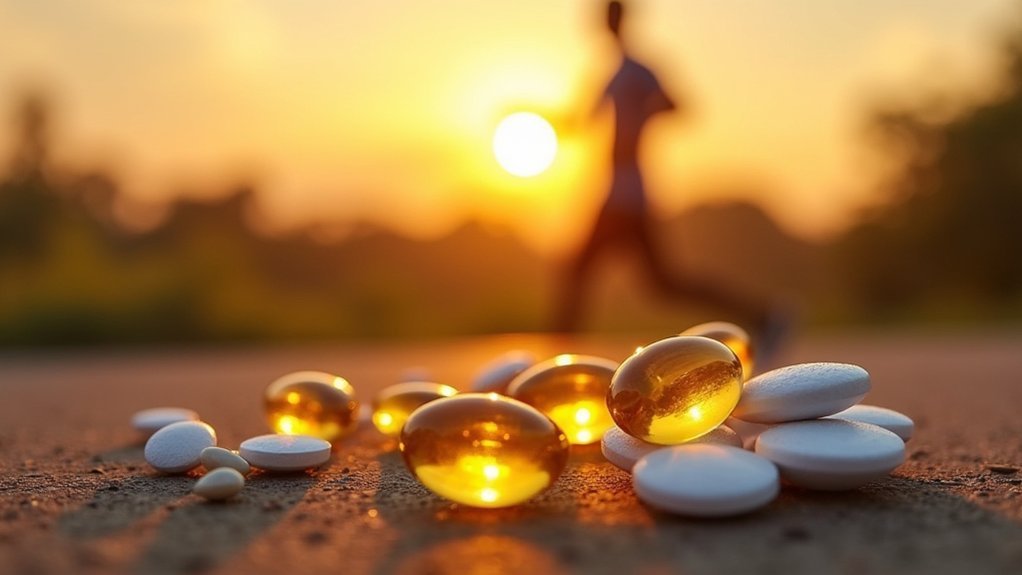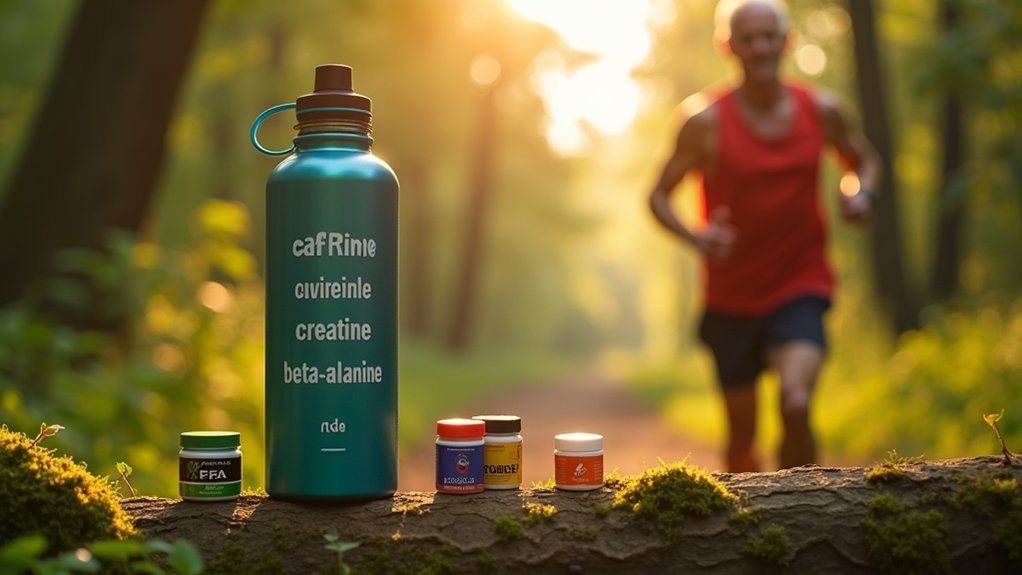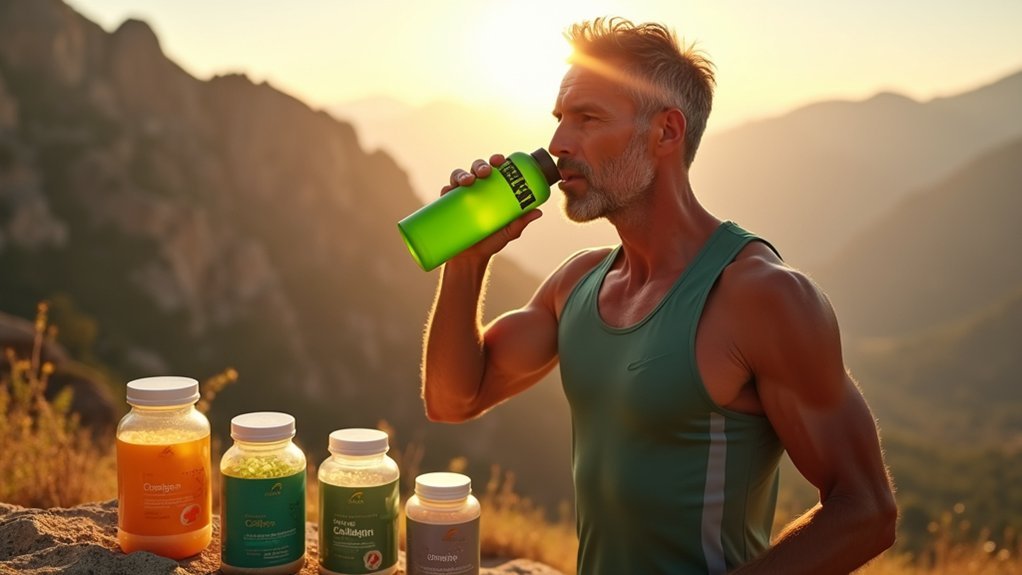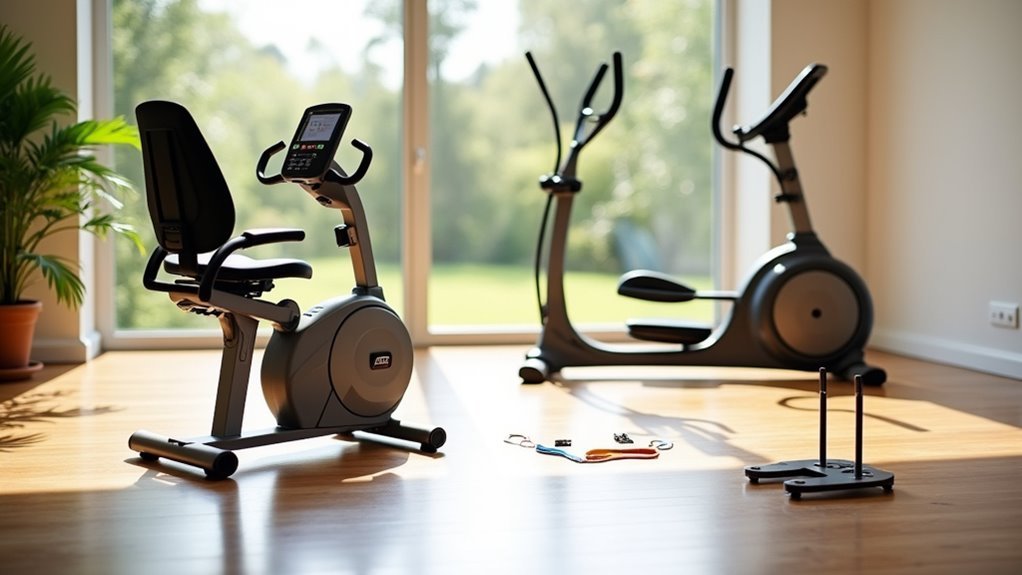Aging endurance athletes need specific supplements to combat age-related challenges. You’ll benefit from protein (1.6-2.2g/kg daily), vitamin D with calcium for bone health, and omega-3s (3g daily) for inflammation control. Consider performance enhancers like caffeine (3-6mg/kg) and creatine (3-5g maintenance), plus joint supporters including glucosamine, chondroitin, and collagen. CoQ10 (30-300mg) helps cellular function, especially if you’re on statins. The right supplement strategy can markedly extend your competitive longevity.
The Unique Nutritional Needs of Masters Athletes

As endurance athletes age, their bodies demand specialized nutritional strategies that differ markedly from their younger counterparts.
You’ll need to adjust both macronutrient and micronutrient intake to combat age-related challenges like decreased protein synthesis, reduced nutrient absorption, and increased inflammation.
Your omega-3 intake becomes essential—aim for 3 grams daily while maintaining an omega-6 to omega-3 ratio of 4:1 or less.
Don’t reduce carbohydrates despite potentially lower energy needs; instead, focus on high-fiber, nutrient-dense sources.
Make certain fat intake stays above 20% of total calories, favoring unsaturated sources from olive oil, avocados, and nuts.
Research shows that masters athletes experience a consistent decline in mitochondrial capacity with aging that affects overall athletic performance.
Pay special attention to vitamins D and B12, calcium, magnesium, and antioxidants to offset age-related absorption issues and combat exercise-induced oxidative stress.
Essential Protein Supplements for Muscle Maintenance
Protein serves as the cornerstone of muscle maintenance for aging endurance athletes. As you age, your body requires more protein—about 1.6-2.2g per kilogram of body weight—to counteract decreased muscle synthesis efficiency.
Whey protein offers fast absorption for immediate recovery, while casein provides slower release for overnight repair. If you’re plant-based, pea and soy proteins serve as excellent alternatives. Look for powders providing at least 20 grams per serving for optimal muscle repair benefits.
Consider supplementing with collagen to support joint health and reduce pain from repetitive training.
For ideal results, distribute your protein intake throughout the day. Consume protein before workouts to enhance muscle synthesis during exercise, immediately after for reduced soreness, and before bed to support overnight recovery.
Combining protein with carbohydrates further enhances recovery and performance adaptation.
Vitamin D and Calcium: The Foundation for Bone Health

While muscle strength often dominates the conversation among aging endurance athletes, bone health provides the crucial foundation that supports your entire athletic framework.
As you age beyond 35, your bone remodeling efficiency naturally declines, making vitamin D and calcium supplementation increasingly important.
Vitamin D guarantees your body absorbs 30% of dietary calcium rather than the mere 10-15% absorption rate when deficient. Aim for blood levels between 32-50 ng/ml to optimize bone density and reduce fracture risk.
You’ll need more calcium than non-athletes due to sweat losses during training. These nutrients work synergistically with magnesium, vitamin K, and trace minerals to maintain skeletal integrity. Women athletes particularly should monitor their intake, as they often fall short of daily calcium requirements compared to male counterparts.
Regular monitoring becomes essential as you age to prevent osteoporosis and guarantee continued performance without injury.
Omega-3s and Anti-inflammatory Support for Recovery
Aging endurance athletes face a common enemy: inflammation. Omega-3 fatty acids, particularly EPA and DHA, offer powerful anti-inflammatory benefits by modulating cytokine production during exercise.
Inflammation is the aging athlete’s nemesis, but omega-3s fight back by regulating your body’s exercise-induced inflammatory response.
These essential fatty acids don’t just reduce muscle soreness—they actively enhance your recovery process.
At doses of 1-3 grams daily, omega-3s improve cardiovascular recovery markers, stabilizing heart rate variability and enhancing stroke volume.
They’re especially valuable for your aging muscles, promoting protein synthesis when combined with amino acids and resistance training. Current recommendations suggest a daily intake of 250-500 mg of EPA+DHA for general health benefits, with athletes potentially benefiting from higher amounts.
You’ll benefit from improved oxygen delivery to muscles through omega-3s’ vasodilatory effects, enhancing both endurance and recovery.
Research shows six months of EPA/DHA supplementation increases muscle size and strength in older adults, while also optimizing mitochondrial function and gene expression—essential adaptations for maintaining performance as you age.
Performance Enhancers: Caffeine, Creatine, and Beta-Alanine

Your timing and dosing strategies with performance enhancers can make a significant difference in your training results.
For caffeine, you’ll want to consume 3-6mg per kilogram of body weight about 60 minutes before your event, while creatine requires an initial loading phase of up to 20g daily for 5-7 days before dropping to a 3-5g maintenance dose. Regular coffee drinkers should consider abstaining from caffeine for 4 to 6 days before important races to maximize its ergogenic effects.
With beta-alanine, you’ll need a longer commitment of 4-12g daily for at least 28 days to experience its fatigue-delaying benefits.
Caffeine Timing Strategies
Strategic timing of caffeine intake can dramatically enhance performance for aging endurance athletes. As you age, optimizing when you consume caffeine becomes even more important to maximize benefits while minimizing side effects. For best results, consume 3-6 mg/kg bodyweight about 60 minutes before exercise when fasted, or up to 180 minutes prior if taken with food.
- Pre-exercise dosing (60 minutes before) aligns peak blood concentration with early activity
- For events lasting 3+ hours, combine pre-exercise dose with 50-100 mg hourly top-ups
- During marathons or ultras, time a 100-200 mg dose about 45 minutes before anticipated fatigue
- Consider your individual metabolism—some athletes need less caffeine (1-2 mg/kg) for benefits
- Pair caffeine with carbohydrates to reduce potential gastric distress
According to recent survey data, approximately 24% of endurance athletes use caffeine supplements specifically for performance enhancement, with energy gels being the most popular form.
Creatine Loading Benefits
Creatine loading, often overlooked by endurance athletes, offers significant benefits beyond its traditional reputation for strength sports.
As an aging endurance athlete, you’ll appreciate how creatine enhances cycling power output and improves performance during high-intensity segments of your races.
While you might notice an initial 1-2kg weight gain from water retention, don’t let this deter you. The advantages—increased ATP availability, improved recovery, and enhanced glycogen resynthesis—outweigh this temporary effect.
Creatine particularly shines in events with varied pacing, helping you power through breakaways and finish-line sprints. The typical loading protocol of 20-25 grams daily for 4-7 days maximizes creatine stores quickly for competition preparation.
For masters athletes, creatine helps counteract age-related muscle power decline, giving you a competitive edge.
Consider it especially valuable during intense training blocks when recovery becomes increasingly important.
Beta-Alanine Dosage Considerations
While creatine enhances power output, beta-alanine offers unique benefits for aging endurance athletes through its ability to buffer muscle acidity during high-intensity efforts.
For ideal results, you’ll need a loading phase of 4-6 grams daily for 4-8 weeks, divided into smaller doses of 1.6-2 grams to minimize tingling sensations. After loading, maintain with 1.6-3.2 grams daily. Beta-alanine is particularly valuable for vegetarian and vegan athletes who typically have lower carnosine levels naturally.
- Most effective for exercise durations between 1-4 minutes, with benefits extending to efforts lasting up to 10 minutes
- Timing relative to workouts doesn’t matter; consistent daily intake is what counts
- Consider sustained-release formulations to reduce paraesthesia (tingling)
- Can be combined with creatine for synergistic performance benefits
- Take with meals containing carbohydrates and protein to potentially enhance uptake
Electrolyte Supplementation for Optimal Hydration
As you age, your body’s ability to regulate fluid balance diminishes, making proper electrolyte supplementation essential during endurance activities.
You’ll need to prioritize sodium, potassium, and magnesium replacement to combat the increased risk of cramping and diminished performance that comes with age-related changes in sweat composition.
Tailoring your hydration strategy with electrolyte-rich fluids will help maintain muscle function, support cardiovascular stability, and delay fatigue—especially during training sessions exceeding one hour. For older athletes, it’s critical to monitor your electrolyte deficiency symptoms as performance decline often precedes noticeable physical discomfort.
Aging Hydration Strategies
Why do electrolytes become increasingly important for masters athletes? As you age, your body’s water percentage decreases, making proper hydration vital for performance.
Your thirst response also becomes less reliable, requiring more deliberate hydration strategies. Supplementing with electrolytes—especially sodium—helps retain water and reduces cardiovascular strain during endurance events. Due to high elevation conditions at ski venues, aging athletes need significantly more fluids than their younger counterparts.
- Start hydrating 24 hours before events, drinking 5-10 mL/kg of body weight
- Monitor your weight before and after workouts to assess fluid loss
- Consider stronger electrolyte supplements than typical sports drinks
- Personalize your approach based on sweat rate and environmental conditions
- Rehydrate immediately post-event to support recovery
Remember to balance your intake to avoid stomach issues while maintaining ideal hydration levels throughout training and competition.
Electrolyte Balance Essentials
Proper electrolyte balance becomes critically important for masters athletes seeking to maintain peak performance. As you age, your body’s efficiency in managing electrolytes naturally decreases, making supplementation increasingly valuable during endurance activities.
Focus on products containing sodium, potassium, magnesium, and calcium—especially when exercising beyond an hour or in hot conditions.
Don’t rely solely on water, as this can lead to dangerous hyponatremia. Instead, choose supplements that combine electrolytes with carbohydrates for simultaneous energy replenishment. However, recent research shows that electrolyte supplements do not effectively prevent sodium imbalances in endurance athletes.
Customize your approach based on your individual sweat rate and training conditions. Watch for warning signs like cramping or unusual fatigue during activity.
Begin supplementation before exercise and maintain intake throughout, prioritizing formulas with approximately 180mg sodium and 400mg potassium per serving for ideal balance.
Joint Health Support: Glucosamine, Chondroitin, and Collagen
Maintaining healthy joints becomes increasingly critical for endurance athletes as they age, with repetitive stress and impact taking a cumulative toll on cartilage and connective tissues.
Research shows supplementation with glucosamine (1-3g daily), chondroitin (400-1200mg daily), and collagen (5-10g daily) may offer protective benefits for your joints.
- Glucosamine may prevent type II collagen degradation while enhancing mitochondrial biogenesis markers.
- Chondroitin works synergistically with glucosamine, offering enhanced chondroprotective effects.
- Hydrolyzed collagen promotes cartilage repair through immune-mediated mechanisms.
- These supplements are generally safe with minimal side effects, making them viable long-term options.
- Consistency matters—supplementation typically requires several months before noticeable benefits appear.
Recent studies suggest glucosamine supplementation may provide heart health benefits, showing a 15% reduction in heart attack and stroke risk among regular users.
While individual results vary, these supplements may help you extend your athletic career by supporting joint health.
Antioxidants and CoQ10 for Cellular Health
Oxidative stress increases with age, making antioxidants like CoQ10 particularly valuable for your cellular health as an aging endurance athlete.
Your body’s natural CoQ10 production decreases over time, potentially limiting your mitochondrial energy production and recovery capacity.
Supplementing with 30-300mg of CoQ10 daily can boost your endurance performance while reducing exercise-induced muscle damage and inflammatory markers. CoQ10 functions as an essential electron carrier in the mitochondrial electron transport chain, directly supporting ATP production for all athletic activities.
Antioxidant Supplementation Benefits
As aging endurance athletes face increased oxidative stress from both exercise and the natural aging process, antioxidant supplements offer a powerful defense system for cellular health.
Combining effective antioxidants with your training regimen can potentially enhance recovery, delay fatigue, and support long-term performance as you age. Research suggests that supplementation may be beneficial when endurance athletes follow restrictive eating practices that limit dietary antioxidant intake.
- Vitamin C and E work synergistically to neutralize free radicals and protect cell membranes from exercise-induced damage.
- Polyphenols found in fruits and green tea may improve aerobic endurance by reducing inflammation.
- Flavonoids help regulate reactive oxygen species (ROS) levels, potentially preventing premature muscle fatigue.
- Carotenoids like β-carotene provide cellular protection against oxidative modifications to DNA and proteins.
- CoQ10 supplementation supports mitochondrial function, which naturally declines with age but remains essential for endurance performance.
CoQ10’s Performance Impact
Coenzyme Q10 stands as a cornerstone supplement for aging endurance athletes seeking to maintain cellular health and performance.
As you age, your natural CoQ10 levels decline, compromising your mitochondrial efficiency and energy production.
Supplementing with 30-300mg daily can greatly enhance your aerobic capacity and oxygen utilization during endurance activities.
The improved mitochondrial function directly translates to increased exercise time before exhaustion and higher sustained peak power output.
CoQ10’s dual role as an energy facilitator and powerful antioxidant means you’ll experience less muscle damage, reduced inflammation markers, and faster recovery between training sessions. For athletes taking cholesterol medications, supplementation becomes especially important since statin medications inhibit natural CoQ10 production in the body.
This protection extends to your muscle cell membranes and mitochondria, preserving the cellular machinery essential for endurance performance while counteracting age-related declines in muscle function.
Sleep and Recovery Aids for the Aging Athlete
While performance-enhancing supplements receive considerable attention, sleep quality and recovery aids may represent the most critical components in an aging endurance athlete’s arsenal.
Your recovery capacity diminishes with age, making proper sleep essential for muscle repair and performance enhancement. Melatonin helps regulate disrupted circadian rhythms, particularly after travel across time zones, while nonbenzodiazepine sleep aids can address occasional insomnia without significant performance impacts when timed properly. Studies consistently demonstrate that sleep deprivation leads to reduced endurance capacity and slower recovery times in athletes of all ages.
- Aim for 8-9 hours of total sleep in a 24-hour period to optimize recovery
- Consider magnesium supplements to support muscle relaxation and nervous system regulation
- Use L-theanine to promote pre-sleep relaxation through increased alpha brain wave activity
- Time melatonin supplementation strategically to align your internal clock with external light-dark cycles
- Implement napping strategies to supplement nighttime sleep and enhance total recovery time
Creating a Personalized Supplement Strategy
Creating an effective supplement strategy requires more than simply following generic recommendations found in fitness magazines. Your unique genetic makeup, metabolic profile, and specific nutrient needs demand a tailored approach.
Start with thorough testing to identify deficiencies and genetic factors affecting nutrient metabolism. Consult with healthcare professionals who understand endurance athletics and aging physiology. They’ll help analyze your results and develop a targeted plan.
Consider incorporating NAD+ precursors for mitochondrial support, personalized antioxidant levels based on your oxidative stress profile, and amino acids matched to your muscle recovery needs. Look for supplements that utilize patented technology for sustained nutrient release throughout your day, preventing energy crashes during training and recovery.
Factor in your diet patterns, training cycles, and lifestyle factors like sleep quality and stress levels.
Digital nutrition tools and wearable technology can help you monitor effectiveness and make necessary adjustments as your body and training demands evolve.
Frequently Asked Questions
How Do Medications Interact With Athletic Supplements?
Medications interact with athletic supplements by affecting absorption, metabolism, and efficacy. You’ll need to watch for specific interactions like NSAIDs with kidney-stressing supplements or blood thinners with vitamin K. Always consult healthcare professionals before combining them.
When Is the Best Time to Take Different Supplements?
Take caffeine 30 minutes before workouts, beta-alanine daily for loading, protein post-exercise, antioxidants pre-exercise, and electrolytes during workouts. Use vitamins D and B throughout the day, and melatonin before bed for recovery.
Are There Gender Differences in Supplement Needs for Aging Athletes?
Yes, there are gender differences. You’ll need different protein amounts (men need more), and as a woman, you’ll benefit more from iron and calcium supplements due to hormonal changes affecting metabolism.
How Should Supplements Change During Injury Recovery Periods?
During injury recovery, you’ll need to increase protein intake, add collagen for tissue repair, boost anti-inflammatory omega-3s, and supplement with vitamin C, D, and calcium. BCAAs and creatine help prevent muscle loss while immobilized.
What Blood Tests Should Monitor Supplement Effectiveness?
You’ll need to monitor vitamin D levels (25(OH)D), inflammatory markers (CRP), muscle enzymes (CK), nutritional markers (albumin, prealbumin), antioxidant status, essential minerals (iron, magnesium, zinc), and B vitamins to properly assess your supplement effectiveness.
In Summary
As you continue your endurance journey, remember that supplements aren’t magic bullets but strategic tools for your aging athletic body. Listen to what your body needs, consult with healthcare professionals, and adjust your supplement regimen as you evolve. With the right combination of protein, joint support, anti-inflammatories, and performance enhancers, you’ll maintain your competitive edge while supporting your body’s changing requirements.





Leave a Reply